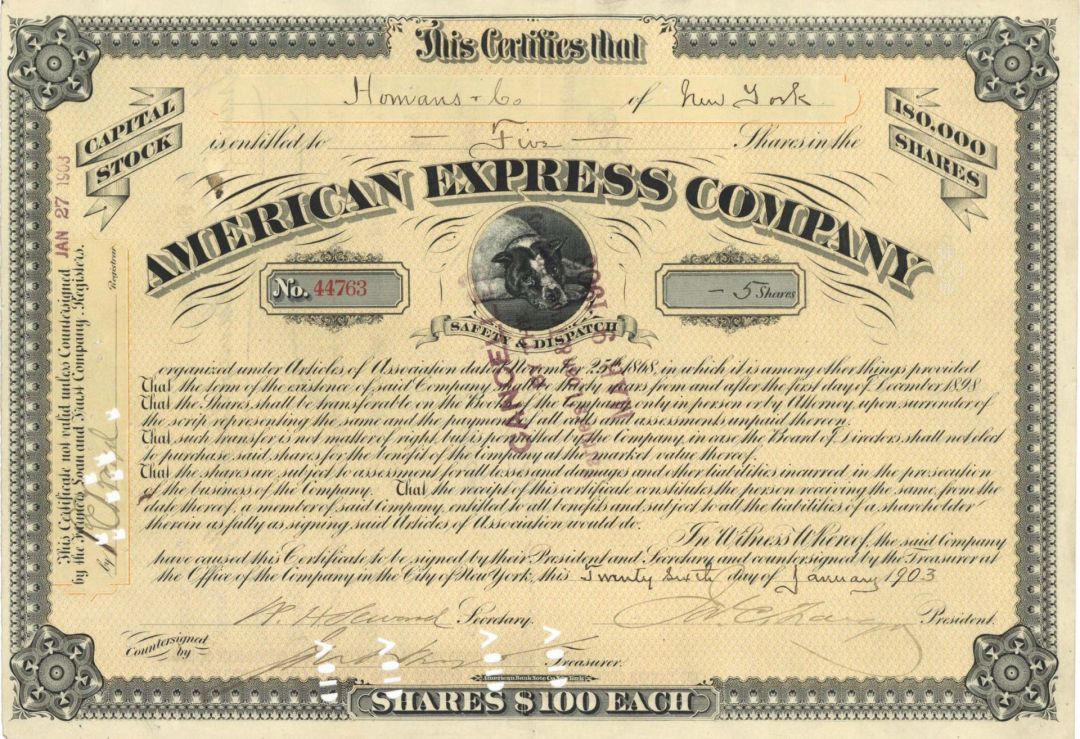American Express Co. signed by J.C. Fargo, J.F. Fargo, and W.H. Seward Jr. - 1895-1911 dated Autographed Stock Certificate
Inv# AG1658 AutographStock signed by James C. Fargo and as president. Also signed by Jas. F. Fargo as treasurer and Wm H. Seward, Jr. as secretary. Portraits and biographies included.
James Congdel Fargo (1829-1915) was the son of James Fargo and began his career with Wells & Co., where his brother, William George Fargo, was a partner, in Buffalo in 1844. In 1866, after serving as agent and manager of the firm's successor, the American Express Company, he relocated to New York to assume the role of General Superintendent and Manager. By 1881, he had advanced to the position of President of both the American Express Company and the Westcott Express Company, as well as the National Express Company. As the president of American Express, James C. Fargo enjoyed considerable wealth and recognition. Thus, it was understandable that he felt slighted when he encountered difficulties cashing checks during a trip to Europe in 1890. The European bankers, unfamiliar with him, refused to honor his checks. This incident raised the question of whether Americans would consistently face cash challenges while traveling in Europe. In response, Marcellus F. Berryn, an employee of American Express, sought to devise a solution. He later remarked, "Every individual has a unique way of signing their name. Therefore, a reliable method for carrying money to unfamiliar locations must include the bearer’s signature and stipulate that it will only be cashed upon the addition of a matching signature in the presence of witnesses." On July 7, 1891, Berryn was awarded four copyrights for what he termed "the travelers cheque," with William C. Fargo receiving the first one. A few weeks later, he successfully cashed a fifty-dollar cheque in Leipzig, Germany, without any issues. In 1891, American Express sold travelers checks amounting to $9,120.00, and this figure has consistently increased each year, reaching $24.6 billion in sales by 2000.

William Henry Seward Jr. (June 18, 1839 – April 29, 1920) was an American banker and brigadier general in the Union Army during the Civil War. The youngest son of William H. Seward, the U.S. Secretary of State under Presidents Abraham Lincoln and Andrew Johnson, Seward was educated at home and developed an early interest in finance. He began his career in banking by forming a partnership with Clinton McDougall and served as a private secretary to his father when he was a U.S. Senator from New York in 1860. Seward opened a private bank in Auburn, New York, in 1861.
He temporarily left banking on August 22, 1862, to join the Union Army, serving as a brigadier general until he resigned his commission on June 1, 1865. After the Civil War, Seward returned to his banking career and resided with his wife at the family homestead in Auburn, New York. He remained active in politics, charitable work, and various patriotic and historical societies. Seward also became a director of several corporations and was involved in founding the Auburn City Hospital in 1875.
In 1886, Seward was elected as a companion of the New York Commandery of the Military Order of the Loyal Legion of the United States and was assigned insignia number 4696, reflecting his continued engagement with military and veterans' affairs after his service in the Civil War.











Ebay ID: labarre_galleries